Featured
 Historians shine light on lesser-known Black History at Bacon’s Castle in Surry County. By Jessica Larche / WTKR
Historians shine light on lesser-known Black History at Bacon’s Castle in Surry County. By Jessica Larche / WTKR
Bacon’s Castle in Surry County is best known for its ties to Nathaniel Bacon, the man who burned down Jamestown and attacked native tribes during a bloody rebellion against Virginia’s governor in 1676.
Now, historians are spreading awareness about the rebellion’s impact on race-based slavery in America and the legacy of Black people enslaved on the land. “The colonial government, after the rebellion, decided to implement what’s called the Black Codes, or in some cases known as the Slave Codes,” said Geraghty, who explained that wealthy plantation owners feared their white indentured servants would rise up again. “[The Slave Codes] are a series of laws that come up after Bacon’s Rebellion enshrining slavery as the race-based, hereditary chattel enslavement system that would persist until 1863.” Read more
Political / Social
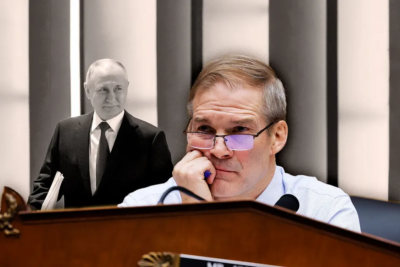 Republicans turn up the racism to drive up GOP opposition to Ukraine. By Chauncey Devega / Salon
Republicans turn up the racism to drive up GOP opposition to Ukraine. By Chauncey Devega / Salon
The GOP’s “welfare queen” attack on President Zelensky makes clear a much larger dynamic at play in Ukrainian war
Here in the United States, the Republican Party is trying to end multiracial pluralistic democracy. Today’s Republican Party no longer believes in American Exceptionalism. As part of their revolutionary campaign to end multiracial democracy, they are looking to autocracies and neofascist regimes abroad in countries such as Poland, Hungary, and Vladimir Putin’s Russia for inspiration and guidance on how to transform American society in their twisted vision. In one of the most striking and worrying examples, Gov. Ron DeSantis is in the process of using Florida as a laboratory for neofascism which will be a model for Republicans and their forces around the country. Read more
Related: Florida Could Start Looking a Lot Like Hungary. By Michelle Goldberg / NYT
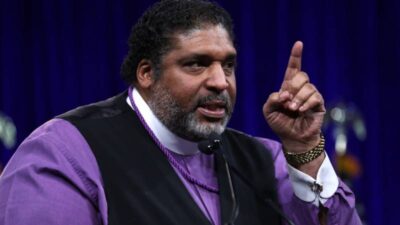 It’s Time to Call Out the DeSantis Deflection. By Rev. Dr. William J. Barber II and Jonathan Wilson-Hartgrove / The Nation
It’s Time to Call Out the DeSantis Deflection. By Rev. Dr. William J. Barber II and Jonathan Wilson-Hartgrove / The Nation
The question isn’t whether the College Board’s AP Black History course is “woke” but whether we’re awake enough to call DeSantis’s bluff.
Even if DeSantis never attacked Black history or trans people, moral leaders and impacted people should be standing up, speaking out, organizing, and voting because of the way his policy decisions have sacrificed the well-being of Floridians, especially the more than 10 million poor and low-wage people, be they Black, white, Latino, Asian, Native, LQBTQIA, or straight. DeSantis wants to argue about whether white students feel guilty when they learn the truth about America’s past, but he has been silent about the fact that 47 percent of Florida’s citizens are poor and low-income, including 39 percent of all white people in his state. Since 1979, income for the top 1 percent of Floridians has nearly doubled. But for everyone else, real income has actually fallen over the same four decades. That’s as true for poor white folks as it is for poor Black folks. Read more
Related: Ron DeSantis, potential GOP standard-bearer, sounds out of his depth. By Eugene Robinson / Wash Post
Related: DeSantis’s ‘Apocalyptic’ Attack on Higher Education. By Michelle Goldberg / NYT
Related: Preaching Freedom, Ron DeSantis Leads By Cracking Down. By Jennifer Szalai / NYT
 AP Black Studies Debate Reveals the College Board’s Race Problem. By Melinda D. Anderson / Capital B
AP Black Studies Debate Reveals the College Board’s Race Problem. By Melinda D. Anderson / Capital B
There’s no mention of the racial wealth gap in AP Economics, and AP Environmental Science glosses over environmental racism, experts say.
That criticism of AP Black Studies is not unique. Experts say the College Board fails to rigorously engage with Blackness across its AP curriculum. The roster of classes generally sidestep interrogating our racialized society, said education professor Suneal Kolluri, who studies race in AP courses at the University of California, Riverside. For instance, the AP Environmental Science course covers questions of environmental pollution but never deals with environmental racism, he said. And AP Economics looks at gross domestic product, supply and demand, and macroeconomics “without ever talking about wealth inequality, or in particular, the racial wealth gaps that exist by way of economic history in the United States, and the racialized capitalism that we live under,” Kolluri said. Read more
 Obama launches leadership network focused on local civic engagement. By Matthew Brown / Wash Post
Obama launches leadership network focused on local civic engagement. By Matthew Brown / Wash Post
The former president said he hopes the initiative ‘will develop, connect and elevate changemakers across the country’
Allies of Barack Obama were amid months-long talks on how to advance one of the former president’s core goals — cultivating America’s next generation of leadership — when the water in Jackson, Miss., was turned off for more than a month last summer. The local leaders who responded to that ongoing crisis displayed many of the traits that Obama, who began his career as a Chicago community organizer, wishes to cultivate across the country, according to those close to him. And they thought those leaders could have benefited from connecting with activists in other states who had faced similar challenges. Read more
Related: Editor’s note: Obama’s efforts on leadership development are laudatory, but he still has a blind spot for HBCUs in this connection. An Open Letter To President Obama: Support For HBCUs Is An Imperative – Ronald J. Sheehy
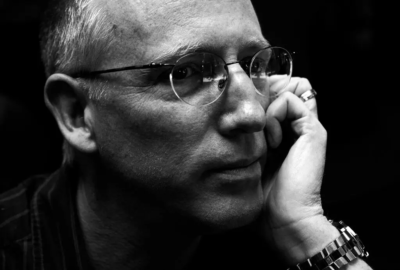 The ‘Dilbert’ Cartoonist and the Durability of White-Flight Thinking. By Charles M. Blow / NYT
The ‘Dilbert’ Cartoonist and the Durability of White-Flight Thinking. By Charles M. Blow / NYT
When Scott Adams, the Donald Trump-revering creator of the “Dilbert” cartoon strip, last week quoted stats from the right-leaning polling operation Rasmussen Reports to justify a racist rant in which he admonished white people to “just get the hell away” from Black people, whom he labeled “a hate group,” the condemnations were swift. Hundreds of newspapers dropped the comic strip, Adams’s publisher scrapped plans to release his next book, and he said his book agent “canceled” him. Read more
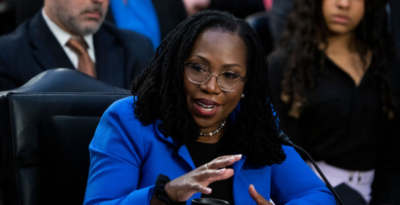 What Justice Jackson’s recusal from affirmative action case means for Black students. By Kayla Jimenez / USA Today
What Justice Jackson’s recusal from affirmative action case means for Black students. By Kayla Jimenez / USA Today
The Supreme Court will decide by June whether colleges can continue to use race as a factor in deciding which students to admit. Two separate cases are before the court, one involving Harvard, an elite private institution, and the University of North Carolina, a highly selective public university.
Justice Ketanji Brown Jackson, the only Black woman on the conservative-leaning court, said during her confirmation hearings last year that she’d recuse herself from participating in the case against Harvard. Jackson served on the board of overseers at Harvard, where she earned her bachelor’s and law degrees. In that role, she was not directly involved in the school’s admissions but did advise the university about its strategic priorities. Although Jackson is participating in the North Carolina case, some advocates for affirmative action were disappointed about her absence from the Harvard case. “When justices are having their discussion, they won’t benefit from her experience,” said Michael Williams of the Coalition for a Diverse Harvard. Read more
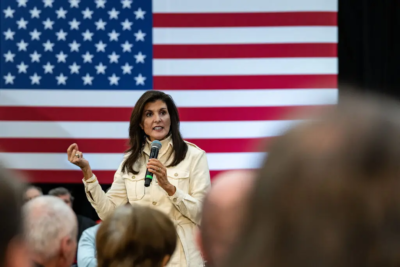 Indian Americans Rapidly Climbing Political Ranks. Maggie Astor and
Indian Americans Rapidly Climbing Political Ranks. Maggie Astor and
The 2024 cycle reflects huge strides in representation: A decade ago, “it was inconceivable that someone named Raj Goyle — let alone Rajeev Goyle — would run for office in Wichita,” said Mr. Goyle, a former Kansas lawmaker.
In 2013, the House of Representatives had a single Indian American member. Fewer than 10 Indian Americans were serving in state legislatures. None had been elected to the Senate. None had run for president. Despite being one of the largest immigrant groups in the United States, Americans of Indian descent were barely represented in politics. Ten years later, the Congress sworn in last month includes five Indian Americans. Nearly 50 are in state legislatures. The vice president is Indian American. Nikki Haley’s campaign announcement this month makes 2024 the third consecutive cycle in which an Indian American has run for president, and Vivek Ramaswamy’s newly announced candidacy makes it the first cycle with two. Read more
 Mayor Lori Lightfoot of Chicago Loses Her Bid for Re-election. Julie Bosman and
Mayor Lori Lightfoot of Chicago Loses Her Bid for Re-election. Julie Bosman and
The result was a resounding defeat that reflected widespread dissatisfaction from voters over her handling of crime. Challengers to her political left and right advanced to a runoff.
Four years ago, Ms. Lightfoot made history as the first Black woman to be elected mayor of Chicago when she swept all 50 of the city’s wards. But she saw her popularity plunge during the coronavirus pandemic as Chicago suffered a spike in violent crime, with looting and destruction on its famed Magnificent Mile in 2020. Read more
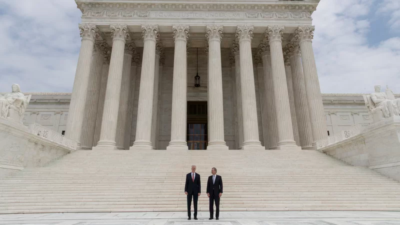 How a Supreme Court justice’s paragraph put the Voting Rights Act in more danger. By Hansi Lo Wang / NPR
How a Supreme Court justice’s paragraph put the Voting Rights Act in more danger. By Hansi Lo Wang / NPR
The roots of the next potential U.S. Supreme Court showdown that could further weaken the Voting Rights Act’s protections against racial discrimination can be traced to a handful of sentences by Justice Neil Gorsuch.
In the summer of 2021, Gorsuch — the first Supreme Court appointee by former President Donald Trump — tacked a single-paragraph concurring opinion onto a major court ruling to “flag one thing.” The ruling was for a lawsuit about Section 2 of the Voting Rights Act. And the “thing” Gorsuch wanted to flag was a question he said no one in the case had raised before the court: Who has the right to sue to try to enforce that key section of the landmark law? For decades, private individuals and groups, who did not represent the federal government, have filed the majority of Section 2 lawsuits that have stopped state and local governments from minimizing the political power of people of color through the redrawing of voting maps and other steps in the elections process. But that longstanding practice may be coming to an end. Read more
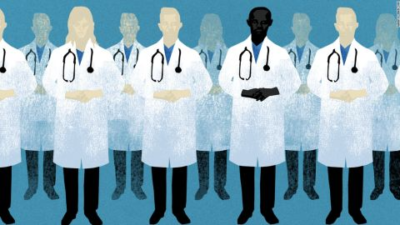 Only 5.7% of US doctors are Black, and experts warn the shortage harms public health. By Jacqueline Howard / CNN
Only 5.7% of US doctors are Black, and experts warn the shortage harms public health. By Jacqueline Howard / CNN
Only about 5.7% of physicians in the United States identify as Black or African American, according to the the latest data from the Association of American Medical Colleges. This statistic does not reflect the communities they serve, as an estimated 12% of the US population is Black or African American. And while the proportion of Black physicians in the US has risen over the past 120 years, some research shows, it’s still extremely low. Read more
Ethics / Morality / Religion
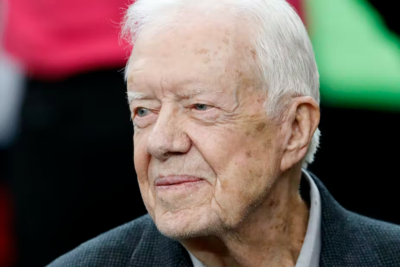 How Jimmy Carter integrated his evangelical Christian faith into his political work, despite mockery and misunderstanding. By Lori Amber Roessner / The Conversation
How Jimmy Carter integrated his evangelical Christian faith into his political work, despite mockery and misunderstanding. By Lori Amber Roessner / The Conversation
After studying Carter’s presidential campaign, presidency and post-presidency for years, which included examining more than 25,000 archival documents, media sources, oral histories and interviews, I wrote “Jimmy Carter and the Birth of the Marathon Media Campaign.” Along the way, I had the opportunity to interview former President Carter in October 2014, when we discussed his life, his presidency and his legacy. Based upon this experience, one observation is certain – Carter was a man of faith committed to a vision of the nation that aligned with his views of Jesus’ teachings. Read more
 Is there really a major wave of antisemitism in America? By Mark I. Pinsky / RNS
Is there really a major wave of antisemitism in America? By Mark I. Pinsky / RNS
The Congregation Beth Israel Synagogue is shown, Jan. 16, 2022, in Colleyville, Texas. The FBI killed pistol-wielding 44-year-old British national Malik Faisal Akram, after a 10-hour hostage standoff at the synagogue.
More than 4 in 10 U.S. Jews feel their status in America is less secure than it was a year ago, according to a new survey by the American Jewish Committee. The survey, conducted in the fall of 2022, was released Monday by the AJC, a prominent Jewish advocacy organization. (AP Photo/Brandon Wade, File). Read more
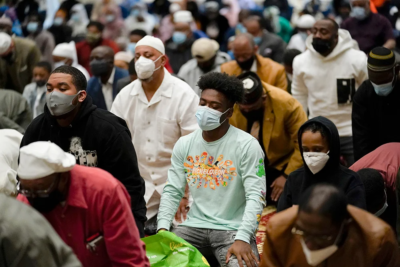 It’s time to stop erasing Black Muslim Americans from the story of Islam in the US. By Salima Suswell / RNS
It’s time to stop erasing Black Muslim Americans from the story of Islam in the US. By Salima Suswell / RNS
Black Muslim Americans make up approximately 20% to 25% of the Muslim American population, often leading the way for all Muslims in the area of civil activism.
Islam was largely introduced to the United States during the trans-Atlantic slave trade as West African captives were brought to the shores of the Carolinas and Virginia to be sold as chattel for free labor. As their feet, shackled, settled in the dirt of an unknown land, they struggled not only to keep their human dignity intact in a slavery system that was developed to destroy it, they struggled to hold onto their layered identities. Their tribal identity, their language, their traditions — and, for many, their worship and their practice of Islam — was taken away in order to make them docile and obedient to inhumane treatment. Read more
 Celebrating the forgotten cultural artists of Black Catholic history. By Laryssa D. Herrington / NCR
Celebrating the forgotten cultural artists of Black Catholic history. By Laryssa D. Herrington / NCR
Billie Holiday, circa June 1946; Claude McKay in a 1920 portrait photograph; and Toni Morrison in 2010 (William P. Gottlieb/Library of Congress; Wikimedia Commons; CNS/Reuters/Philippe Wojazer)
Ironically, the church and larger community of Black Americans have forgotten the distinctly Catholic faith of many of the Black cultural artists and activists who have contributed to the shaping of this unique history. For many, their Catholic imagination was responsible for shaping and honing their art, a fact that is often overlooked when reflecting on their individual legacies. Read more
Historical / Cultural
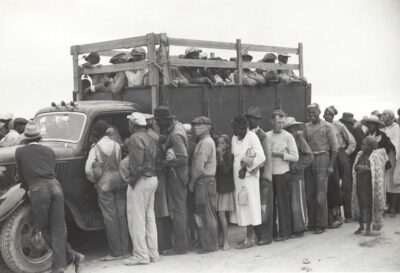 Rosewood Massacre at 100: Black Florida History and White Terror. By Dan Royles / AAIHS
Rosewood Massacre at 100: Black Florida History and White Terror. By Dan Royles / AAIHS
“Vegetable pickers, migrants, waiting after work to be paid, near Homestead, Florida, February 1939” (the New York Public Library Digital Collections)
This year marks the hundredth anniversary of the Rosewood Massacre, when hundreds of whites descended on the nearly all-Black community of Rosewood, Florida, intent on wiping out any trace of the town and its people. On New Year’s Day 1923, a white woman in nearby Sumner had accused a Black man of assaulting her. The hunt for her supposed assailant led a posse of whites to Rosewood. Residents there were apt to defend their homes, and a firefight left several of the white attackers dead. In retaliation, even more, white men poured into Rosewood, intent on its destruction. Most Black residents fled into the surrounding swamp, but those who could not were murdered by the mob, which also set fire to every building in town, save for the home of John Wright, a white man. Read more
 Examining the Grand Ole Opry’s complicated role in Black history and the road ahead. By Marcus K. Dowling / USA Today
Examining the Grand Ole Opry’s complicated role in Black history and the road ahead. By Marcus K. Dowling / USA Today
Over its 97-year history, there is a fair argument to be made that there could be no better place to understand America’s complicated history with Black people than the Grand Ole Opry. Shown is Deford Bailey.
Country music’s citadel crystallizes how far removed America has — or has not — grown past the twin impacts of antebellum stereotypes and the Nixon-era “Southern Strategy’s” grip on its past, present and future. From Charley Pride to vocal trio Chapel Hart, from DeFord Bailey to bluesman Jontavious Willis, the Opry has highlighted a century of Black excellence. But the institution has also highlighted political leaders and artists often associated with racist ideologies, tempering greatness with antagonism. The road ahead for the Opry is potentially better than the road it has traveled. History without awareness can repeat itself. It is vital to consider how the Opry as a stage presentation has occupied a flawed yet fighting stance for how country music best represents racial equity. Read more
 1776 Is Not Just What Ron DeSantis Wants It to Be. By Jamelle Bouie / NYT
1776 Is Not Just What Ron DeSantis Wants It to Be. By Jamelle Bouie / NYT
I want to focus on this requirement that colleges and universities teach American history as consistent with “the creation of a new nation based on universal principles stated in the Declaration of Independence.”
This requirement is obviously partisan. But it rests on a bipartisan and widely shared vision of the Declaration and the American founding, in which 1776 — and the statement of principle at the heart of the Declaration of Independence — is an engine of progress that leads inevitably and inexorably to everything from the Constitution to the abolition of slavery. The founding fathers, in this telling, may not have lived up to the ideals of the Declaration, but their words would shape and inspire the struggles to come. “The assertion that all men are created equal was of no practical use in effecting our separation from Great Britain,” observed none other than Abraham Lincoln, “and it was placed in the Declaration, not for that, but for future use.” Read more
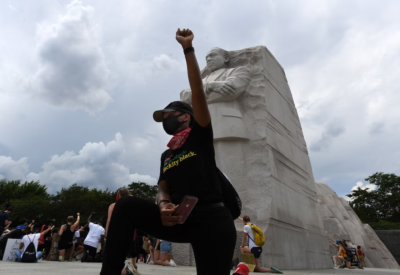 Today’s civil rights movement is so different from the ’60s. By Perry Bacon Jr. / Wash Post
Today’s civil rights movement is so different from the ’60s. By Perry Bacon Jr. / Wash Post
America marks Black History Month each February largely by focusing on events from decades ago. But we are living through an important time in Black history right now, too.
 Diversity roles disappear three years after George Floyd protests inspired them. By Curtis Bunn / NBC News
Diversity roles disappear three years after George Floyd protests inspired them. By Curtis Bunn / NBC News
The wave of change in workplaces through diversity, equity and inclusion roles has quelled, and Black workers will feel the brunt of the officers’ absence
Diversity, equity and inclusion leaders, who were hired in waves to help companies achieve an ethnically balanced workforce after George Floyd’s murder in 2020, are being phased out, surveys indicate, leaving experts in the field concerned that corporations’ talk of affecting change was just empty words. Read more
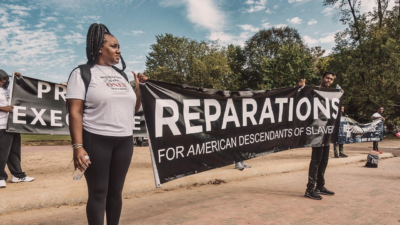 San Francisco debates reparations for Blacks: Is $5 million each enough? By Emmanuel Felton / Wash Post
San Francisco debates reparations for Blacks: Is $5 million each enough? By Emmanuel Felton / Wash Post
Conservatives say the proposal to give qualified Black residents $5 million each would be financially ruinous for the city, and even some reparations advocates dismiss the figure as an unrealistic distraction
Tasked with calculating how much San Francisco should pay its Black residents for decades of discrimination, a government-appointed panel didn’t develop a mathematical formula. Instead, over the past year and a half, its 15 members have been studying the city’s history. In the 1960s, city leaders demolished part of the Fillmore District, a neighborhood once known as the Harlem of the West, displacing 883 businesses and 20,000 people, most of them Black. Decades later, thousands of people remain displaced and the neighborhood has turned into a predominantly White enclave of multimillion-dollar homes. Read more
 From the street to the stage: Hip-hop is reinventing itself with the help of symphony orchestras. By Christopher A. Daniel / Andscape
From the street to the stage: Hip-hop is reinventing itself with the help of symphony orchestras. By Christopher A. Daniel / Andscape
Rappers and classical musicians are increasingly eager to collaborate
Last month, Jeezy stepped on stage backed by the Atlanta Symphony Orchestra to reimagine his 2005 major label debut, Thug Motivation 101: Let’s Get It. The packed house was full of suited-and-booted Black folks who mouthed every word of the album’s signature anthems, while the orchestra reimagined the trap drums and eerie sounds of Jeezy’s breakout album. Read more
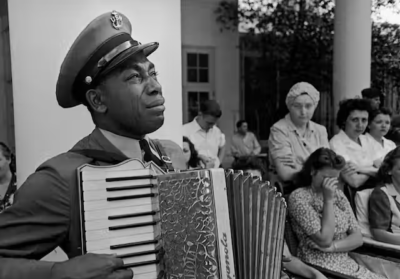 I’ve spent 5 years researching the heroic life of Black musician Graham Jackson, but teaching his story could be illegal under laws in Florida and North Dakota. David Cason / The Conversation
I’ve spent 5 years researching the heroic life of Black musician Graham Jackson, but teaching his story could be illegal under laws in Florida and North Dakota. David Cason / The Conversation
The story of Graham Jackson is a timeless tale of American ingenuity, hard work and the cream rising to the top. It’s also a tale of economic inequality, overt racism and America’s Jim Crow caste system.
As one of the first Black musicians to play on national radio, Jackson is best known for the April 13, 1945, photograph of him that was published by Life magazine, one of the leading publications of its day. In that image, Jackson, dressed in his U.S. Navy uniform, is seen playing the song “Going Home” on an accordion as the train carrying the body of President Franklin Delano Roosevelt leaves the station in Warm Springs, Georgia, for his burial in Hyde Park, New York. Read more
Sports
 A late convert to golf, Fred Perpall is now president of the USGA. By Michael Williams / Andscape
A late convert to golf, Fred Perpall is now president of the USGA. By Michael Williams / Andscape
He’s the first Black person to lead the sport’s governing body in the U.S.
A latecomer to the game of golf – he started playing only about a decade ago – Fred Perpall, 48, was elected president of the United States Golf Association on Saturday, the first Black man to lead the organization in its 129-year history. Perpall, who lives in Dallas, is CEO of The Beck Group, a commercial architecture and construction business and also a member of the board of directors of FedEx. He has bachelor’s and master’s degrees in architecture from the University of Texas at Arlington. In college, he played basketball and ran track and was part of the Bahamian national basketball team. Read more
 Vanessa Bryant Settles Helicopter Crash Photos Lawsuit for $28.85 Million. By Jonathan Abrams / NYT
Vanessa Bryant Settles Helicopter Crash Photos Lawsuit for $28.85 Million. By Jonathan Abrams / NYT
Bryant, the widow of the basketball star Kobe Bryant, sued Los Angeles County after some of its employees shared graphic photos of the crash that killed her husband and one of their daughters.
Los Angeles County agreed to pay Vanessa Bryant and three of her daughters nearly $30 million to settle a lawsuit and potential claims over the sharing of graphic photos of the January 2020 helicopter crash that killed Bryant’s husband, the basketball star Kobe Bryant, and one of their daughters, according to a court filing on Tuesday. The settlement includes $15 million a jury awarded Vanessa Bryant in August, with additional funds to settle potential claims from her daughters. Read more
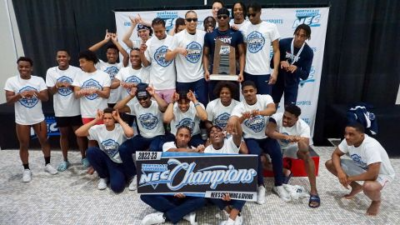 Howard University men’s swimming and diving team wins first championship in 34 years. By and
Howard University men’s swimming and diving team wins first championship in 34 years. By and
The men’s swimming and diving team at Howard University won the 2023 Northeast Conference Championship on Saturday, the team’s first title in more than 30 years, the school’s athletic department tweeted.
The all-Black swim team earned 928 points during five days of competition in Geneva, Ohio, surpassing four other teams by a margin of 169 points, according to the results posted on the Northeast Conference Championship’s website. Howard, one of the oldest historically Black universities in the US, defeated teams from Long Island University, St. Francis College in Brooklyn, and Wagner College. Read more
 Damian Lillard scores 71 points, tied for most since Kobe Bryant’s 81. By Ben Golliver / Wash Post
Damian Lillard scores 71 points, tied for most since Kobe Bryant’s 81. By Ben Golliver / Wash Post
Site Information
Articles appearing in the Digest are archived on our home page. And at the top of this page register your email to receive notification of new editions of Race Inquiry Digest.
Click here for earlier Digests. The site is searchable by name or topic. See “search” at the top of this page.
About Race Inquiry and Race Inquiry Digest. The Digest is published on Mondays and Thursdays.
Use the customized buttons below to share the Digest in an email, or post to your Facebook, Linkedin or Twitter accounts.